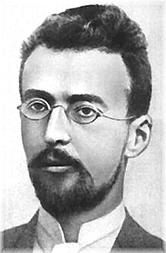- Mieczysław Karłowicz
-
 Karłowicz's Stone (see external links) in the Tatra Mountains marking the spot where the composer's body was found. Note: the swastika symbol visible on the memorial is inspired by swastika symbols which in the past were common in the folk art of the Podhale region. It has no connection whatsoever to the Nazi symbol.
Karłowicz's Stone (see external links) in the Tatra Mountains marking the spot where the composer's body was found. Note: the swastika symbol visible on the memorial is inspired by swastika symbols which in the past were common in the folk art of the Podhale region. It has no connection whatsoever to the Nazi symbol.
Mieczysław Karłowicz (11 December 1876 – 8 February 1909) was a Polish composer and conductor.
Contents
Early life
He was born in Vishneva (present-day Belarus) into a noble family being part of the Clan of Ostoja. His father Jan was a Polish linguist, lexicographer, and musician. As a child he studied the violin, for which instrument he later wrote his only concerto.
Karłowicz studied at Warsaw with Prof. Noskowski, Piotr Maszynski, and Gustaw Roguski. He later studied in Berlin with Heinrich Urban for whom he dedicated his Serenade for Strings, composed and performed when he was still his student. From 1906 to 1907 he studied conducting with Arthur Nikisch.
Career
His music is of a late-romantic character. Karłowicz was great admirer of Tchaikovsky whose 6th symphony he praised. Influence of his music can be seen in earlier works of Karłowicz: E minor symphony and the violin concerto. Like most of late romantics he also fell under considerable influence of Richard Wagner with Tristan und Isolde above all. Nevertheless he managed to develop original musical language expressed in harmony and orchestration, latter of which Karłowicz mastered like few other composers and wrote some of the most colourful orchestral music to be found.
Karłowicz wrote a symphony in E minor (Rebirth, opus 7), a violin concerto in A major (opus 8) and his output also contains several tone poems, including Eternal Songs, Stanislaw and Anna Oswiecimowie, The Returning Waves and The White Dove. He also wrote a number of songs for voice and piano, setting words by Kazimierz Przerwa-Tetmajer, Adam Asnyk, and others. Much of the rest of his small output was lost during World War II.
The music of Karłowicz inhabits a prime place in the history of Polish music between Fryderyk Chopin and Karol Szymanowski.
Karłowicz spent much of his later years in Zakopane, in the south of Poland, often enjoying one of his favorite hobbies, photography in the nearby mountain scenery.
Death
He died at 33, while skiing on an excursion in the Tatra mountains in an avalanche in 1909. Mieczysław Karłowicz was buried at Warsaw's Powązki Cemetery.
Recent Bibliography
- Sala, Luca. European Fin-de-siècle and Polish Modernism. The Music of Mieczysław Karłowicz, Bologna, Ut Orpheus Edizioni, 2010.
- Anders, Henryk. Mieczysław Karłowicz. Życie i dokonania, Poznań, ABOS, 1998.
- Wightman, Alistair. Karłowicz, Young Poland and the Musical Fin-de-siècle, Aldershot, Ashgate, 1996; Polish translation by Ewa Gabryś, Karłowicz. Młoda Polska i muzyczny fin de siècle, Kraków, PWM, 1996 (Monografie Popularne).
See also
External links
- "Polish culture profiles:Mieczysław Karłowicz". http://www.culture.pl/en/culture/artykuly/os_karlowicz_mieczyslaw. Retrieved 2007-01-07.
- Free scores by Mieczysław Karłowicz at the International Music Score Library Project
- "Karłowicz's Stone - the last itinerary of Mieczyslaw Karłowicz (music, photos, videos, maps)". http://karlowicz.free.fr/e. Retrieved 2009-02-23.
Categories:- 1876 births
- 1909 deaths
- Polish composers
- Romantic composers
- Skiing deaths
- University of Warsaw alumni
- Sport deaths in Poland
- Deaths in avalanches
- Natural disaster deaths in Poland
- Fryderyk Chopin University of Music in Warsaw alumni
- Clan of Ostoja
Wikimedia Foundation. 2010.

